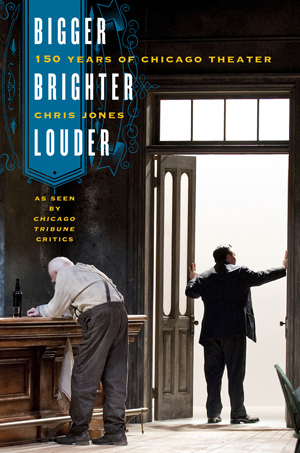
Bigger, Brighter, Louder: 150 Years of Chicago Theater As Seen By Chicago Tribune Critics (University of Chicago Press) was published in October to positive reviews. The 376-page hardcover chronicle of Chicago's theatrical history (also available on Amazon Kindle), by chief Tribune theatre critic Chris Jones, would make a great holiday gift idea for the theatre lover or Chicago history buff on your list.
That history starts in 1853 with the first known theatre review published in the Tribune, buried as it was amidst stories about a pair of half-ton hogs to be slaughtered and a record-breaking load of lumber set to ship. "And thus Chicago's priorities were starkly laid out right there on that page," Jones begins in the introduction. What follows is a thoroughly researched and curated account of how the pig capital of the prairie developed into the theatrical center it is today, through the eyes and pens of the men and women who served what became the Midwest's preeminent newspaper. Jones selects reviews marking important productions or turning points in the city's theatrical history and places them in a larger cultural context, beginning with Peregrine Pickle's review of Joseph Jefferson's performance in Rip Van Winkle in 1868 and culminating with Jones' own review of the Goodman Theatre's 2012 production of The Iceman Cometh, starring Brian Dennehy and Nathan Lane. Many other familiar names appear: Tennessee Williams, Lorraine Hansberry, Sidney Poitier, Edward Albee (and his mother), David Mamet, John Malkovich, celebrated critic Richard Christiansen, as well as scores less famous but no less key. In addition to reviews, Tribune stories about events such as the Iroquois Theater fire of 1903, the emergence of the Off-Loop theatre scene, and the eternal competition with and comparison to New York are included as well.
Throughout his fifteen years with the Tribune, Jones has been a vocal proponent of the Chicago theatre scene and its importance to American drama. Bigger, Brighter, Louder is a continuation of that argument and a contextualization of the Second City's achievements. Actors, directors, playwrights, critics, and patrons both local and national will appreciate this historical perspective on one of America's great theatre towns as they look ahead to the new year and their own future contributions to the American stage.
Luke Heiden
Contributing Writer

 Follow Us On Twitter
Follow Us On Twitter